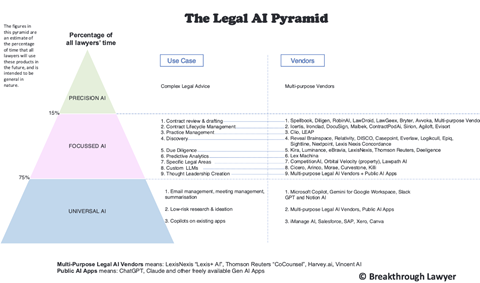Generative AI will transform the work of law firms and in-house teams. With a plethora of vendors offering products, Nick Abrahams sets out why it is crucial to pick the right tool

LegalTech has long been heralded as a transformative force for the profession, promising to automate routine processes and enhance efficiency. However, the reality has often fallen short of these expectations. While there have been notable successes in areas such as e-discovery, content management, contract lifecycle management, and practice management, the broader impact of LegalTech has been less disruptive than anticipated. Lawyers, known for their cautious approach to innovation, have largely continued their traditional practices with only incremental changes prompted by technology.
However, the advent of generative AI (GenAI) is poised to change this narrative. Unlike previous technologies, GenAI offers the potential for profound transformation in the legal industry. It can analyse vast amounts of data, draft complex documents, and even purport to predict case outcomes, with a level of sophistication previously unattainable. Many law firms and in-house teams are already reporting that the impact of GenAI on legal services has been significant – and this is just the beginning.
The belief in GenAI’s role in the legal industry exists on a spectrum. On one end are the enthusiasts who envision a future dominated by ‘robo-lawyers’, where AI systems take over entire legal functions. For instance, Goldman Sachs announced last year that AI could perform 44% of the tasks traditionally handled by lawyers, reflecting a bullish view of AI’s capabilities. On the other end are the sceptics who, having witnessed other tech trends such as blockchain rise and fall without significantly affecting their practice, view AI as just another passing fad.
The reality probably lies somewhere in between. GenAI should be seen not as a replacement for lawyers, but as an empowering tool akin to an ebike for lawyers. It can enhance their capabilities and efficiency, serving as a valuable assistant rather than a threat to their jobs. While GenAI holds immense promise, it will augment rather than replace the nuanced and critical role lawyers play in society.
Navigating the legal GenAI landscape
We are currently in the midst of what can be termed ‘peak legal GenAI’. A plethora of vendors are offering AI-enabled solutions designed to enhance various aspects of legal practice. For lawyers, understanding this landscape is crucial to identifying which tools can most effectively meet their needs and improve their workflows.
The GenAI vendor landscape can be categorised into three main types of offering:
- General productivity solutions: these tools are not legally trained and are aimed at enhancing general productivity of knowledge workers. Microsoft Copilot, Gemini for Google Workspace, Slack GPT and Notion AI are a few examples.
- Use-case-specific legal AI solutions: these vendors focus on particular legal tasks, such as contract review or due diligence, though they may also offer additional functionalities in adjacent areas. Their specialised focus allows them to deliver highly effective solutions tailored to specific legal challenges. Many of these tools have been around for some time but are now adding GenAI into the mix.
- Multi-purpose legal AI solutions: these vendors offer legally trained AI platforms designed to address multiple legal use cases. Key players include Lexis+ AI, Thomson Reuters’ CoCounsel, Harvey.ai, and vLex’s Vincent AI. Their versatile platforms cater to a wide range of legal needs, making them attractive to legal teams looking for comprehensive AI solutions.
Understanding where each AI tool fits within the vendor landscape can help lawyers make informed decisions about which solutions to adopt, ultimately enhancing their practice and service delivery.
As part of my research for the short, online course I teach at Bond University, ‘GenAI Productivity Training for Lawyers’, I have explored how law firms and in-house legal teams are adopting GenAI. This research led me to create an AI pyramid framework which helps lawyers evaluate legal GenAI products and determine whether they would be a good fit for their legal practice.
This framework categorises AI solutions based on the extent to which lawyers are likely to need the solution’s specific functionality.
Universal AI: at the base of the pyramid, we find broad-use general productivity AI solutions that a large majority of lawyers can integrate into their daily practices. These tools are not specifically legally trained but offer general productivity enhancements that are relevant across various legal fields. Examples include AI-driven email management, document summarisation and meeting/reporting assistance. These solutions are accessible and beneficial to almost every lawyer, making them a foundational aspect of the modern legal toolkit.
Microsoft Copilot for MS 365 is a Universal AI service, which complies with Microsoft 365’s existing privacy, security and compliance commitments. Furthermore, it can be used in existing workflows (using Word, Outlook, Teams, PowerPoint, Excel and other productivity software, for example). This encourages the adoption of new technology by lawyers because it minimises disruptions and maximises efficiency.
Many law firms and in-house legal teams are currently trialling universal AI tools. It is anticipated that within the next 12 to 24 months, universal AI tools will become commonplace in legal practice. Although universal AI tools are not specifically trained in legal knowledge, they can be useful productivity tools in professional settings, assisting primarily with administrative tasks. Many organisations report a significant productivity boost, ranging from 15% to 30%, when using universal AI tools.
Also in the universal AI area are AI copilots for existing enterprise software solutions. For example, companies such as iManage and Salesforce have deployed AI copilots to assist with existing platforms.
In addition to universal AI tools, public AI applications such as ChatGPT, Claude and Gemini are gaining traction among lawyers. They are accessible on a free or $20/ month paid tier, making them an attractive option for legal professionals seeking to quickly integrate AI into their practices. However, it is crucial for lawyers to exercise caution when using these platforms, particularly concerning the confidentiality of information. As confidentiality is not guaranteed, sensitive or confidential information should not be entered into these tools. Despite this limitation, they can be effective for a variety of non-confidential research, management and HR-related tasks.
When it comes to legal research, these public platforms perform moderately well in areas where there is abundant, high-quality information available online. For instance, researching a topic such as the EU privacy framework, the GDPR, yields reasonably accurate high-level results because of the wealth of quality articles written on this topic. However, the reliability of these tools diminishes when dealing with less commonly discussed issues, obscure or rapidly changing areas of law, highlighting the importance of validating all research results, as these AI solutions can often produce incorrect information.
Focused AI: the middle tier of the pyramid consists of legally trained AI solutions that address specific legal use cases, such as due diligence or contract review, and e-discovery. These use-case-specific legal AI solutions are designed to tackle more specialised tasks and will not be relevant for all lawyers, all the time. Their targeted nature allows for more precise and efficient handling of specific tasks, providing significant value to practitioners in those areas.
Precision AI: at the peak of the pyramid are AI solutions aimed at assisting lawyers with complex legal analysis. These tools will be used less often by lawyers. Generally, lawyers will use precision AI when engaged in detailed legal research. These solutions purport to represent the cutting edge of what AI can achieve in the legal domain.
However, it is very difficult for the machine alone to reach the level of accuracy required by lawyers. Consequently, the outputs of these solutions always need to be reviewed by the legal professional.
This area is being primarily targeted by multi-purpose legal AI solution vendors who are endeavouring to leverage advanced AI capabilities to provide nuanced insights and analysis. Key vendors in the precision AI space include established legal research companies and innovative new entrants:
- Lexis Nexis and Thomson Reuters: these longstanding leaders in legal research are expanding their offerings with AI-driven tools.
- Harvey.ai: a notable newcomer in the precision AI space, Harvey is a super-law startup backed by significant investment. Harvey.ai aims to disrupt traditional legal research and analysis by offering cutting-edge AI solutions that deliver high levels of accuracy and efficiency.
- vLex’s Vincent AI: another innovative entrant, Vincent combines advanced AI technology with a comprehensive legal database to offer robust solutions for complex legal issues.
The output of these tools still needs careful vetting and does not replace the need for human assessment of the output.
Conclusion
It is broadly accepted that legal teams are likely to employ a combination of universal AI and one or more focused AI and precision AI solutions to optimise their operations. The integration of GenAI into the legal sector marks a pivotal moment in the evolution of legal practice, offering transformative potential that LegalTech alone has not realised. As universal AI tools enhance daily productivity, focused AI solutions address specific legal challenges, and precision AI aims to assist with analysing complex legal issues, the legal profession stands at the cusp of significant change.
By embracing these technologies, lawyers can not only increase efficiency and accuracy but also elevate the quality of legal services provided. As we navigate this new landscape, the key will be to use AI as an empowering tool that complements the expertise and judgment that only skilled legal professionals can provide.

Nick Abrahams is the global co-leader of the digital transformation practice at Norton Rose Fulbright. He is also an adjunct professor at Bond University where he teaches the online, short course The Breakthrough Lawyer: GenAI Productivity Training for Lawyers































No comments yet